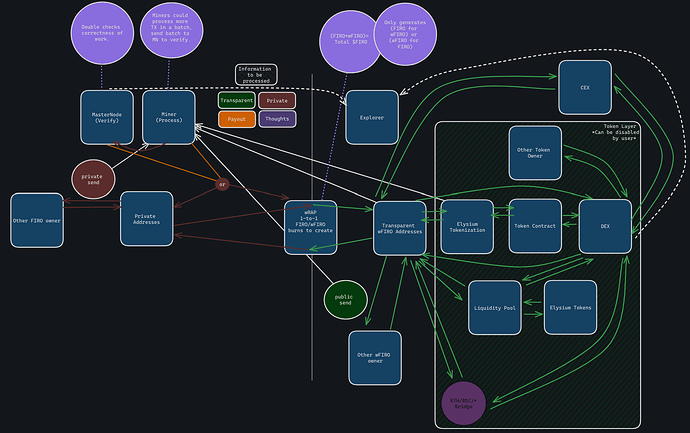As you are aware, privacy coins have been facing increasing regulatory pressure that have resulted in delistings in several regions particularly in Europe because of new MICA regulations which prohibit the listing of cryptocurrencies that have inbuilt anonymization features.
We have been liaising with important exchanges on this to see how we can come to a balanced approach on this and meet both our needs.
From feedback, exchanges do not want to accept deposits that have an unidentified sender even if it’s to a KYC-ed account. This means masternode rewards and Lelantus transactions would need to be excluded. So exchanges would need to put those funds on hold and return it to the sender. Unlike in a Bitcoin or Eth transaction where they can easily just send it back to the sender address, they can’t do this automatically because the sender is unidentified from the transaction.
We were given two options to remain listed:
a) Remove privacy completely; or
b) Give the exchanges a way for users to prove they were the ones who made a private transaction deposit so that they can return the funds to the user.
One of the reasons why Firo was singled out vs other coins that still have transparent pools as well is because there are many users who do use Lelantus transactions to deposit into the exchange (vs other coins) that results in a lot of manual work for the exchange.
Obviously option a) is out of the question. b) is still workable provided there is no backdoor and it’s at the option of the user. This was always the plan to allow people to selectively reveal to who they choose that they paid for something and is important for even normal use cases. (see Lelantus Spark payment proofs).
We already have devised a way for users to sign a message with their wallet to prove that they made a Lelantus transaction (similar to Bitcoin signing a message) so that exchanges can return funds to them if they had deposited it via a Lelantus transaction. We are awaiting feedback if this is satisfactory but are confident that it will be.
This however has several ramifications:
- Coins with mandatory privacy such as XMR will have problems staying listed. This is because every deposit would need to go through this process and there is no way for them to send from a transparent address. This further pushes back Firo’s goal to move towards mandatory privacy, though we still can have privacy by default.
- The UI for our wallets in Spark/Lelantus would need to warn when sending to a transparent address.
Another alternative which I’m personally not to keen on is to create a special type of transparent address that only will accept transparent transactions. This to me sets a dangerous precedent since it creates barriers between the private and transparent layers.
Of course one might ask, what is preventing a user from unshielding to a transparent address and then sending to an exchange address? Nothing for now which is why I’m still okay on this proposal. It does add additional friction but to me this is the lesser evil than the eventual complete delisting from centralized exchanges or at be limited to the more anon ones like TradeOgre or NonKYC or ones that live in regulatory grey areas. This to me hurts adoption and also breaks a lot of integrations that rely on these centralized exchanges.
In an ideal world, I would want mandatory privacy and not rely on centralized exchanges but Firo in its current state of growth cannot do so. As this is a departure from our previously stated commitment to move towards mandatory privacy ASAP, I would like to seek community feedback on this. From the development side we would still be pushing adoption of Spark addresses via Helsing in masternodes and making it the default way to transact in our wallets. That doesn’t change.
I know some would say, screw regulations, screw centralized exchanges, we’ll survive but I think a more pragmatic approach is required here for the long term viability of the project. Also while projects like XMR would still survive, it would also suffer a huge loss of liquidity if it were to lose Binance and Kraken as well though it would also push DEX adoption (which is also what Firo is gunning for).
I am of course frustrated with the hypocrisy of such regulations but at the same time happy and relieved that there’s a way forward for the moment with this. To me, the line that they are drawing while not desirable is not to the point of compromising on the fundamentals of our project. To make it clear, I would never support a backdoor where the core team or regulators can deanonymize transactions but will always support the ability for the user to disclose if they want to.
Would like everyone’s thoughts on this!
